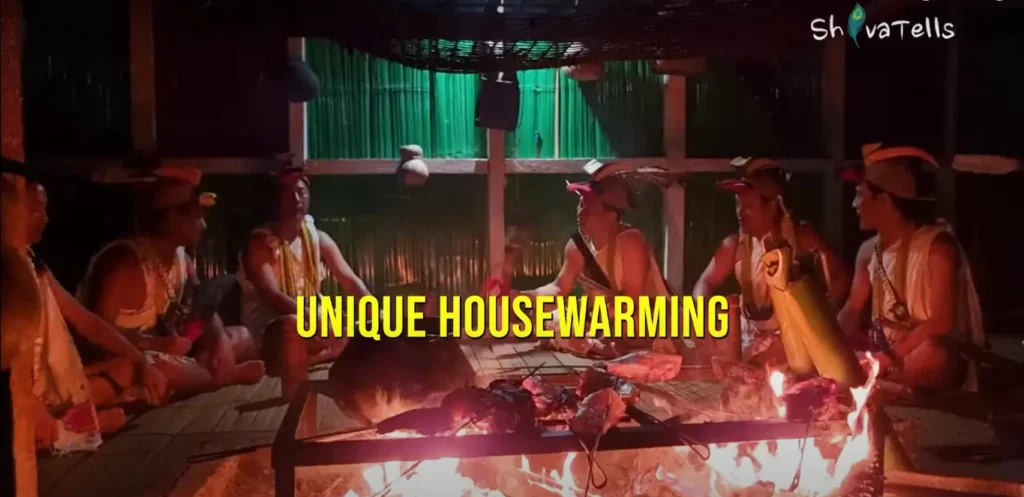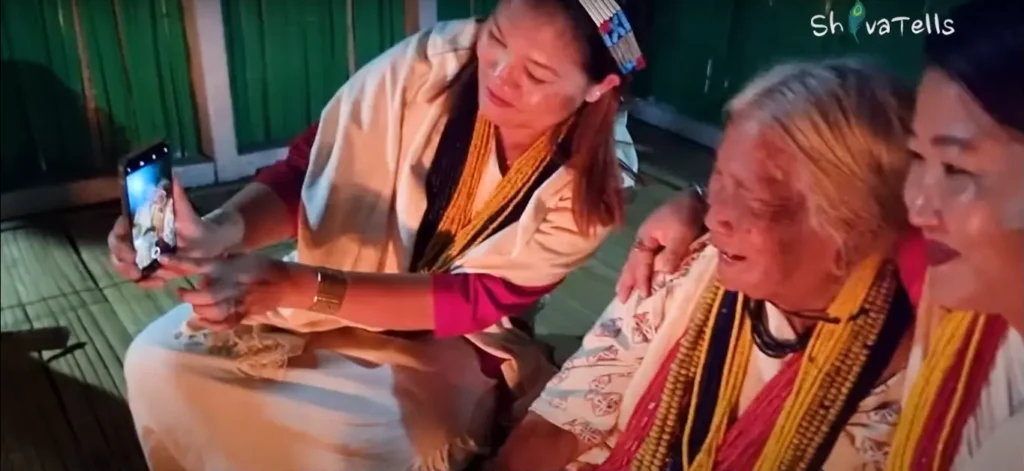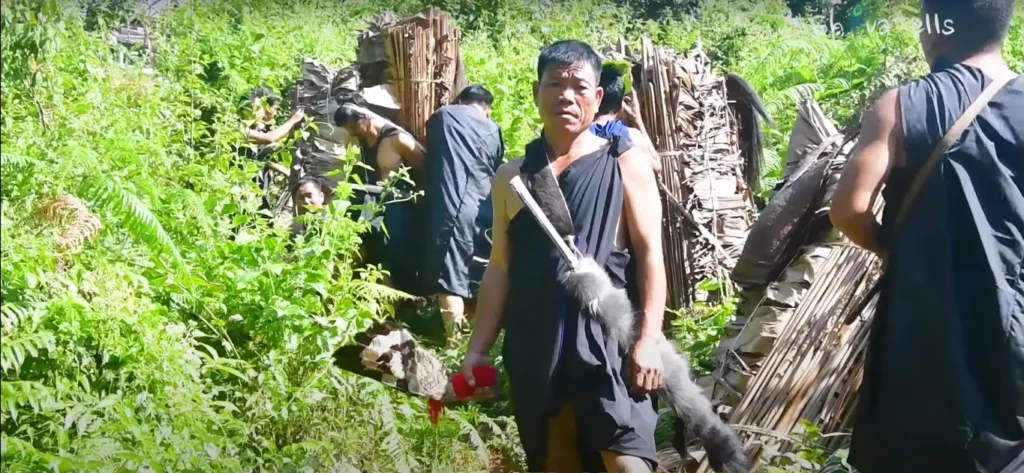Your Shiva is here! Today, we’re taking a trip to Arunachal Pradesh, the beautiful land of towering mountains, misty valleys, and vibrant cultures. And guess what? We’re crashing a housewarming party, Nyishi style! But don’t worry, it’s a friendly affair, filled with laughter, stories, and a whole lot of fun. Let’s learn about the Nyishi Tribe.

Table of Contents
Introduction to the Nyishi Tribe

The Nyishi Tribe people, an indigenous tribe inhabiting Arunachal Pradesh, India, are one of the region’s largest ethnic groups. Their distinct cultural heritage stems from a rich history and unique traditions.
Rooted in the verdant forests of Arunachal Pradesh, the Nyishi community is renowned for their deep connection to the land and their adherence to a traditional way of life. They excel in agriculture, hunting, and gathering, skillfully utilizing their environment’s resources for sustenance.
Nyishi Tribe’s Unique Traditions and Customs
The Nyishi tribe takes pride in its unique traditions and customs, which are showcased through various aspects of daily life. One of the most striking features of Nyishi culture is their traditional attire, characterized by intricately woven shawls, adorned with vibrant colors and tribal motifs. These garments not only serve as a symbol of cultural identity but also signify the tribe’s connection to its ancestral roots.
Festivals and celebrations hold immense significance in Nyishi culture, providing an opportunity for the community to come together and rejoice in their shared heritage. Festivals like Nyokum and Reh are celebrated with great enthusiasm, featuring traditional dances, music, and rituals that pay homage to the tribe’s ancestors and deities.

Nyishi tribal rituals, deeply rooted in animistic beliefs, play a pivotal role in preserving the tribe’s cultural identity. From agricultural ceremonies invoking blessings for a bountiful harvest to rites of passage marking significant life events, these rituals serve as a link between the past and the present, reaffirming the tribe’s collective bond and spiritual connection with the land.
The artistic prowess of the Nyishi people is evident in their exquisite crafts, including bamboo and cane work, pottery, and handwoven textiles. These age-old techniques, passed down through generations, reflect the tribe’s ingenuity and creativity, showcasing their mastery of traditional craftsmanship.
Now read my great and happy Party movement with the Nyishi Tribe.
Ayekam! Let’s Explore a Nyishi Housewarming: Fun, Stories, and Blessings!
Housewarmings these days can be a bit…well, boring, right? Fancy houses, fancy food, everyone showing off. But with the Nyishi people, it’s a whole different story. Building a new house is a huge deal! It’s like welcoming a new member to the family.
Here in Arunachal Pradesh, everything is connected to nature. Every tree, every rock, every stream has a spirit, you see. And when the Nyishis build a house, they believe they’re borrowing from these spirits. So, the housewarming is a way to say thank you and make sure everyone’s happy.
Here’s the coolest part: the party is a giant game of friendly arguments and teasing! We call it “Adi Eggtung.” Picture this: the guests and hosts challenge each other with riddles and stories about the house itself. “Who taught us where to find the perfect water source?” they might ask, their voices rising in a playful chant. And whoever knows the story about the wise spirit who guided the Nyishis to water gets a little reward!

These stories, these aren’t just your average bedtime tales. They’re about our ancestors, about Abu Tani, the father of the Tani clan. They’re about how we learned to make our local rice beer, Apong. Did you know Apong has its own epic story? Apparently, Abu Tani had to win over a grumpy spirit who guarded the recipe! He did this by, well, let’s just say it involved a magical fern and a whole lot of delicious consequences.
The night isn’t just about bragging rights (though a little friendly competition never hurt anyone!). As the night deepens, we gather for a mesmerizing dance. It’s a way to ask the spirits of nature to bless the new house, to keep it safe and prosperous. It’s beautiful, this tradition. It’s a chance to share stories, laugh with family and friends, and pass on our rich heritage to the younger generation. No more boring parties where everyone just eats, drinks, and leaves! This is a night of fun, blessings, and learning.
So, What Makes this Nyishi Housewarming so Special?
- Storytelling: It’s a vibrant celebration of our culture and history. These stories are like living treasures, passed down through generations.
- Community: It’s a chance to come together, young and old, to share knowledge and strengthen the bonds of our community.
- Respect for Nature: The whole ceremony reminds us of our deep connection to the natural world and the importance of living in harmony with it.
Want to experience a Nyishi housewarming yourself? Well, maybe not literally (crashing a party might be a bit rude!), but you can definitely learn more about Nyishi culture and Arunachal Pradesh! Here are some ideas:
- Visit Arunachal Pradesh: If you ever get the chance, come see this beautiful state for yourself. The people are warm and welcoming, and the landscapes are breathtaking.
- Research online: There are tons of resources online about the Nyishi people and their traditions. You can find articles, videos, and even listen to recordings of traditional music.
- Try Apong (responsibly!): If you can find a good source, try a taste of Apong, our delicious rice beer. Just remember, it’s best enjoyed in moderation!
Alright, folks, that’s all for today. I hope you enjoyed this glimpse into a Nyishi housewarming. Remember, these friendly arguments and stories are more than just fun; they’re the threads that weave together our culture and traditions. Here’s to keeping these beautiful stories alive, through hymns, chants, and maybe even a little friendly teasing!
Other stories from Arunachal Pradesh
- Dance that built Bridges – Aji Lamo Folk Dance from Mukto village of Arunachal Pradesh
- Poison festival – Jihang festival of Simong Village
